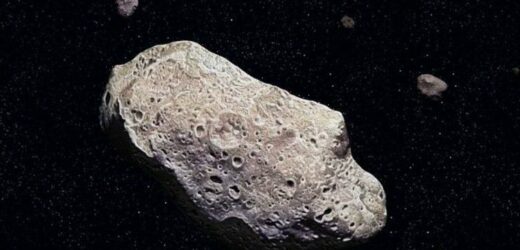Asteroid: NASA track Near Earth Object 2020 QD5
We use your sign-up to provide content in ways you’ve consented to and to improve our understanding of you. This may include adverts from us and 3rd parties based on our understanding. You can unsubscribe at any time. More info
The massive asteroid, about the size of a stadium, is hurtling towards Earth and will soar past on July 24. It is moving at over eight kilometres per second, which is around 17,900 mph.
Given this enormous speed, anything in its path would be destroyed due to the impact.
The asteroid, called 2008 GO20, could be up to 220 metres wide, and is significantly bigger than Edinburgh Castle which stands at 135 metres.
The asteroid will fly safely through the Earth’s orbit on Saturday at 8.35pm.
It will be flying by at a distance of 28,70,847,607 km – roughly eight times the distance between Earth and the moon.
While it is suspected to be harmlessly passing through, its close orbit to the planet has been classified as Apollo – which contains the most dangerous asteroids.
READ MORE: UFO ‘found’ in crater on asteroid belt planet Ceres – claim

Nasa has said that the situation is being closely monitored.
Earlier in June, an asteroid the size of the Eiffel Tower labelled 2021 KT1 came close to Earth.
It approached Earth at a distance of 4.5 million kilometres.
It was classified as “potentially hazardous” as anything closer than 4.6 million kilometres is potentially dangerous.
DON’T MISS
Asteroid twice the size of Statue of Liberty to pass Earth [UPDATE]
Asteroid described as ‘potentially hazardous’ due to come near Earth [REVEAL]
Asteroid described as ‘Near Earth’ just shot by our planet [INSIGHT]

There are over 26,000 near-Earth asteroids and over 1,000 of them are considered potentially hazardous, according to NASA.
For an asteroid to be considered near-Earth, the distance from our planet to the space rock is less than 1.3 times the distance from Earth to the Sun.
Asteroids are essentially fragments and debris left over from 4.6 billion years ago when the Solar System was formed.
Their orbital pathways are sometimes influenced by the gravitational pull from planets.
Source: Read Full Article

